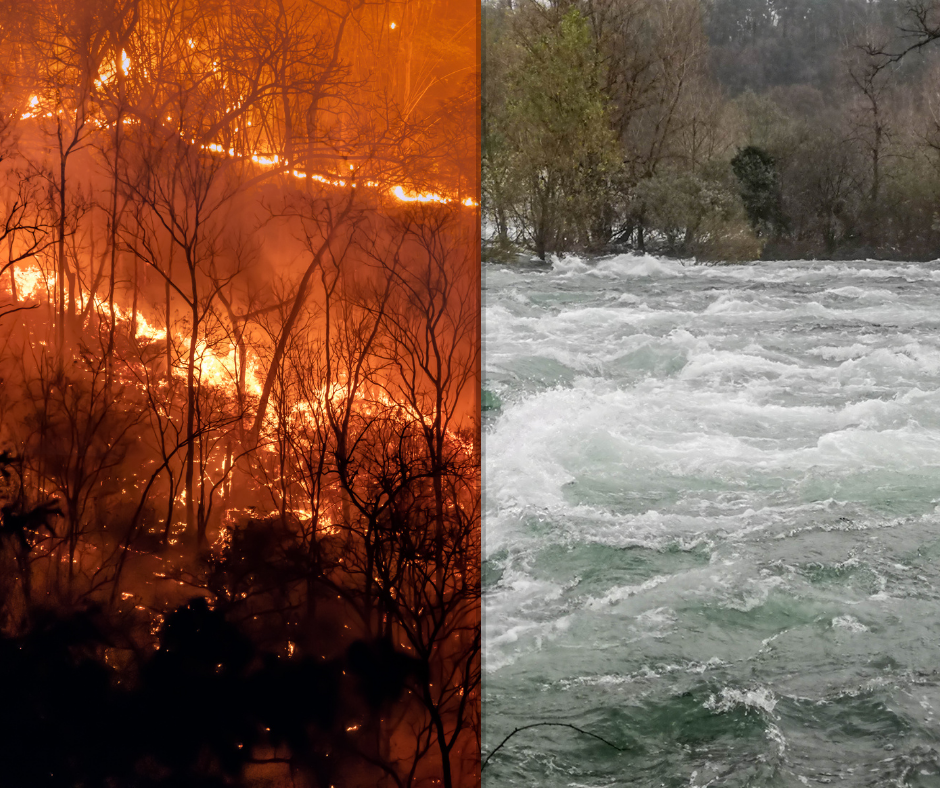LA Fires and the Climate Connection
New UCLA research connects the dots between the climate crisis and the supercharged LA wildfires. “Hydroclimate whiplash” means worse floods, droughts, and fires.

Like millions of Angelenos, I’ve been staying indoors and off the roads, glued to the Watch Duty app, radio, and TV coverage as LA is engulfed by these historic fires. The last 48 hours of coverage has focused, understandably, on the firefight and immediate devastation. Now, it’s time to start hearing about the climate connection, especially from local officials, policymakers, and the TV news anchors that so many people turn to for information during scary urban fires.
There’s a helpful new paper that connects the dots between the climate crisis and LA’s supercharged wildfires. The key connection is what’s called “hydroclimate whiplash,” – rapid swings between intensely wet and dangerously dry weather – that is increasing worldwide, according to the paper published this week in Nature Reviews.
“The evidence shows that hydroclimate whiplash has already increased due to global warming, and further warming will bring about even larger increases,” says Daniel Swain, a climate scientist with UCLA and UC Agriculture and Natural Resources who led the study. “This whiplash sequence in California has increased fire risk twofold: first, by greatly increasing the growth of flammable grass and brush in the months leading up to fire season, and then by drying it out to exceptionally high levels with the extreme dryness and warmth that followed.”
Swain and the other authors note that previous research has focused solely on the “precipitation side of the equation” rather than the full “bloom-and-burn” cycle driven not just by lack of rain but by an increasingly thirsty atmosphere evaporating moisture out of plants and soil.
Is climate change behind the insane 80 mph winds (which Angelenos will tell you were wilder than any Santa Ana winds we’ve seen before)? Not necessarily.
“There’s not really much evidence that climate change has increased or decreased the magnitude or likelihood of the wind events themselves in Southern California,” Swain says in this UCLA report. “But climate change is increasing the overlap between extremely dry vegetation conditions later in the season and the occurrence of these wind events. This, ultimately, is the key climate change connection to Southern California wildfires.”
It will take days, not weeks, for climate scientists to produce the kind of attribution science studies that link specific weather events to global heating. But extreme weather is already the context. And mitigation—our failure to quickly transition away from fossil fuels—is part of the story. Science tells us that burning fossil fuels is a large part of what makes wildfires like the Palisades, Eaton and Hurst fires more likely and more severe by creating this hydroclimate whiplash.
Unfortunately, the climate connection has not yet shown up in much of the TV coverage that people rely on. At this point, I’ve seen lots of TV reporters brave flames, console distraught homeowners, and even help save backyard chickens. But I have not seen them start to add context to why this tragic, billions-of-dollars worth of destruction is happening. On Wednesday, ABC, CBS, and NBC evening broadcasts covered the fires without mentioning climate change once, according to authors at the Column blog. My quick survey of stories by local ABC, CBS, Fox, and NBC affiliates turned up a single story focused on the climate connection, but even that was just an Associated Press digital story republished by ABC7.
Already many news outlets are turning to the question of adaptation—and our failure to adapt—which is another major storyline with policy implications. In many parts of California, we have designed our homes, neighborhoods, infrastructure, and insurance system for a bygone era and a bygone climate. We need to talk about rebuilding in different places. Building back electric, not gas. There’s a lot to dwell on there too, but I hope we can draw the climate connection now while the fires are still raging.
Reader Comments
7 Replies to “LA Fires and the Climate Connection”
Comments are closed.






Why California Wildfires are NOT Climate Driven: A Historical and Meteorological Perspective:
“…California’s relationship with fire predates the Industrial Revolution and certainly modern climate discussions. Historical records and studies consistently demonstrate that large wildfires have been a natural part of the state’s ecosystem for millennia. According to the U.S. Geological Survey, the frequency of large wildfires in Southern California has remained relatively consistent over the last century, with human settlement and land management playing a much larger role than global temperature trends…”
https://wattsupwiththat.com/2025/01/08/why-california-wildfires-are-not-climate-driven-a-historical-and-meteorological-perspective/
Patrick T. Brown on the LA Fires and Climate Change:
“…The article wastes no time highlighting the triad of wildfire factors: meteorology, fuel conditions, and ignition sources. By doing so, it establishes a holistic foundation. This is a welcome break from the overemphasis on climate change often seen in mainstream discussions….”
Link to above article:
https://wattsupwiththat.com/2025/01/09/patrick-t-brown-on-the-la-fires-and-climate-change/
Climate scientists earn their living attributing events to climate change.
Yesterday, I watched a Brazilian news program on television that explained the connection between climate change and the wildfires in California. A clear explanation that aligns with the information in today’s blog.
Climate journalists also earn their living attributing events to climate change.
I was quite depressed of how instead of being sympathetic to LA Residence, some Key figures and Fox news got an opportunity to further their blame game to advance their political agenda.
the Worst thing came when the Fox News Host, Jesse went further to belittle the LA Fire Department as “DEI” for Hire.
These Red State Republicans who are known to be utter racist are least learned persons in US with over 80% to be Non-Graduate College. Thank to the sound leadership of our California Governor, Newsom.